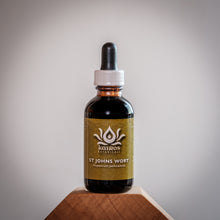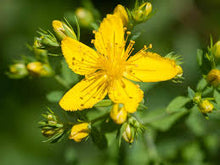Most famously used for treatment of depression, St John’s Wort is also used as an expectorant, diuretic, sedative, and anti-viral.
(NB - Consult your doctor for medical advice before taking St. John’s Wort.)
Made with fresh harvested flowers and flower buds.
Bottle: 50ml
-----------------------------------
Would you like to know more? Below you can find an excerpt from our book "Medicinal Perennials to Know and Grow"
Most famously used for treatment of depression, St Johns Wort is also used as an expectorant, diuretic and sedative.
This herbaceous perennial grows naturally throughout much of the world’s temperate regions. Its growth habit can often confuse some growers as the plant displays 2 different looking growth patterns. In the first year it creeps along the ground, while in its subsequent years, the plant sends up freely branching erect stems to 3 feet with abundant blooms from June through until August. The first flowers commonly appear near June 24th, the day celebrated as the birthdate of John the Baptist, hence the name St. John.
When crushed, the fresh, star-shaped, golden yellow blossoms and flower buds exude a blood-red juice. When the flowers and buds are infused in olive oil, the resulting crimson oil, applied externally, helps to restore damaged nerve tissue from wounds, sores, ulcers, swellings and rheumatism.
The plant prefers a well-drained but moisture retentive soil with full sun and is hardy in Zones 3 to 7.
Seeds are best sown in spring on the surface of a sandy soil mix, keeping them evenly moist and in the light, as they are light dependant germinators. Transplant or thin to 3 or 4 feet apart.
Pluck off one of the small lanceolate leaves, hold it up to the sun and observe the perforated appearance of the leaf, perforatum.
Be warned of the iridescent St. John’s Wort beetle (Chrysolina hyperici) that can destroy plants in a season, two if you’re lucky! The beetle was introduced to control wild St. John’s Wort, which is considered harmful to some livestock, causing photosensitivity, as it also can in some people.
The plant has been considered a potent plant for over 2000 years, providing protection from demons and driving away evil spirits. Esteemed for strengthening the urinary organs, St John’s Wort has become well known for its antidepressant qualities and also as an antispasmodic. Its antiviral properties are also recommended for treating some of the symptoms of Shingles.
Be aware that St. John's Wort may reduce the effectiveness of a number of prescription medications, so consult your physician before using this valuable herb.






